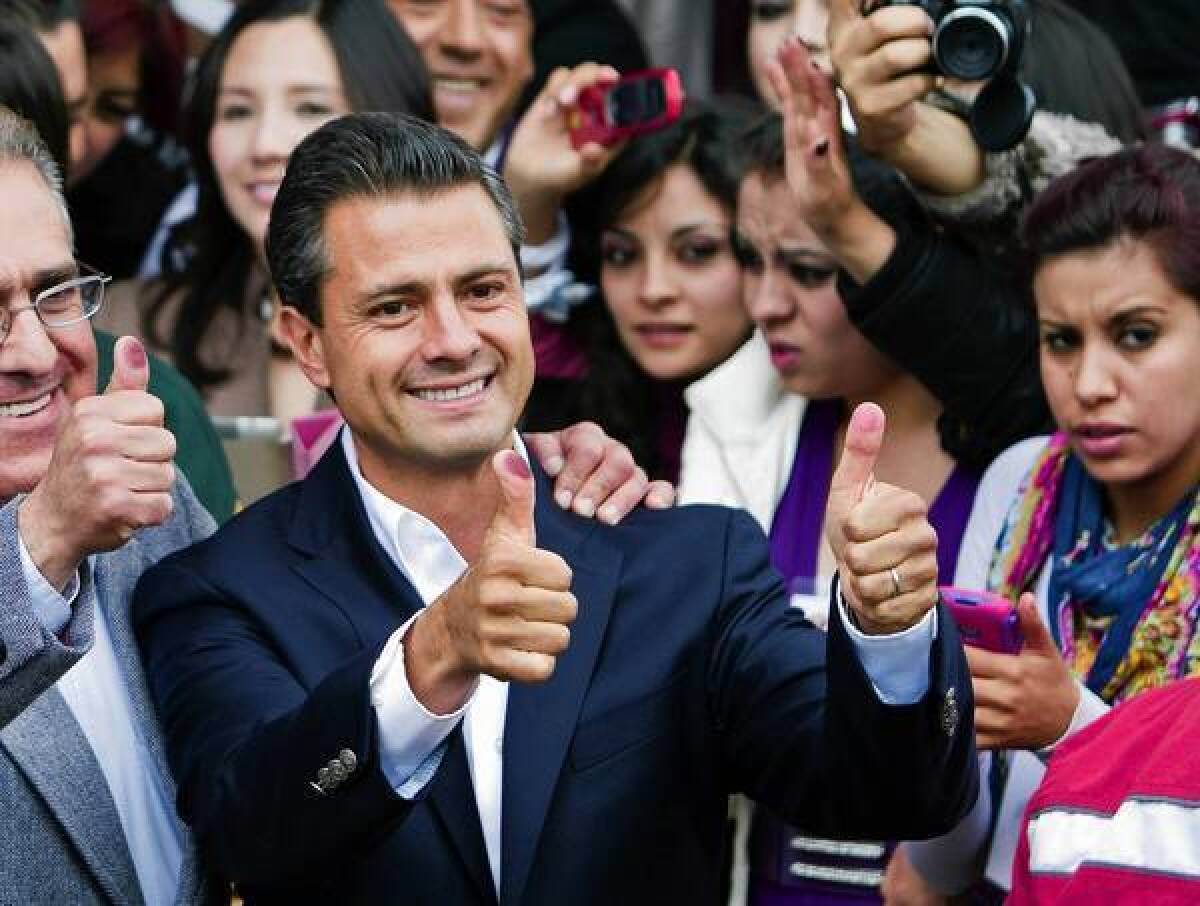Incoming President Enrique Peña Nieto inherits a bruised Mexico

- Share via
MEXICO CITY — When Enrique Peña Nieto assumes the Mexican presidency on Saturday, returning to power a once-autocratic party that ruled for seven decades, he will immediately confront a sluggish economy and a bloody war against drug gangs.
How he will handle those two problems is the biggest question surrounding the incoming government.
Peña Nieto, 46, and his Institutional Revolutionary Party want to shift the focus away from the battle against drug cartels that consumed and ultimately haunted outgoing President Felipe Calderon.
But Peña Nieto is inheriting a bruised, terrified and polarized nation that has lived through its most violent period since its revolution a century ago. Tens of thousands of people — mayors, police, journalists, lawyers, officials, businessmen as well as criminals — have been killed. Thousands are missing, and human rights abuses by authorities have skyrocketed in the six-year campaign against the drug gangs.
Despite the elimination of several top drug lords, the flow of narcotics has not slowed. The gangs have only extended their influence from the border with the U.S. deep into southern Mexico and beyond.
Calderon, meanwhile, will take on a teaching position at Harvard University, swiftly leaving the country he ruled since 2006. Presidents are limited to one term in Mexico, and Calderon’s National Action Party came in a poor third in last summer’s election.
The PRI finished first, but with only about 38% of the vote, limiting the mandate that Peña Nieto will enjoy and complicating his ability to push through ambitious reforms he promised. He will have to struggle to balance competing forces within his party: the so-called dinosaurs who evoke old-school, heavy-handed politics versus the U.S.- or Europe-educated modernizing younger members. His Cabinet, announced Friday, contains both.
“The most serious problem for Peña Nieto is his desire to draw a line between those traditional PRI practices … and the image of modernity that is incompatible with the old way of doing politics,” commentator Ezra Shabot said in an El Universal news column this month.
Instead of the drug war, Peña Nieto would like to talk about the economy, foreign investment and jobs. But security issues will be unavoidable from Day 1.
The new president has pledged, rather vaguely, to “reduce violence” and cut the homicide rate as a way to return to besieged Mexicans a sense of safety and tranquillity. Critics fear that means pulling punches when it comes to persecution of drug gangs.
In the past, the PRI was known to enter into pactos, or deals, with cartel leaders to keep the peace and share the profits.
Peña Nieto has angrily denied that he plans to cut deals with drug gangs, something that would be more complicated today because of their fragmented nature and the acute viciousness of one of the newer and now-dominant groups, the Zetas.
He has said he will keep the army deployed throughout the country, as Calderon did, at least initially. In addition, he will demote the U.S.-backed federal police while building up a national gendarmerie that in theory would eventually replace the military in the drug offensive.
Despite the PRI’s long nationalistic streak, Peña Nieto says he intends to maintain and would like to expand Mexico’s close cooperation with the United States in security matters. Currently, the U.S. supplies intelligence data to Mexican authorities for the tracking of traffickers and is training thousands of police officers, judges, prosecutors and others as part of a $2-billion aid program.
He has already hired Gen. Oscar Naranjo, retired head of the Colombian national police, as a special security advisor. Naranjo is beloved by the Americans and is expected to bring on board U.S.-promoted tactics from the Colombian conflict, including the increased use of small, vetted police or military units for raids.
Calderon’s strategy was faulted for concentrating on military force and underestimating cartel strength while failing to go after the money, much of it laundered through Mexican businesses and banks.
Peña Nieto is promising a new, reformed PRI, one that will not revert to its old habits of election-rigging, paying off supporters, co-opting the opposition and occasionally beating them up.
The Mexico of today is very different from that of nearly two decades ago, when the last PRI president was elected. Some, but certainly not all, of its institutions are stronger, such as the Supreme Court and the news media, and can provide a counterbalance to the presidency.
Yet six years of bloodshed have left a dispirited society that may be willing to give ground to organized-crime kingpins if it at least means being left alone.
Polling data released this week show roughly equivalent portions of Mexicans saying the drug war was Calderon’s most important achievement and his biggest failure. And about two-thirds of those surveyed said they believed the cartels were winning the war.
Serious systemic problems, like impunity and corruption — perfected under the long PRI reign — will continue to hinder any progress Peña Nieto hopes to make.
On the economy, Peña Nieto has stressed his plan to open up the state-run oil giant Pemex to private and foreign investment, long a taboo here. To do so means challenging the Pemex unions that have long allied themselves with the PRI.
Already, another key reform, on labor workplace rules, passed the Legislature only after the PRI gutted measures that would have forced powerful unions to be more accountable and transparent.
More to Read
Sign up for Essential California
The most important California stories and recommendations in your inbox every morning.
You may occasionally receive promotional content from the Los Angeles Times.











